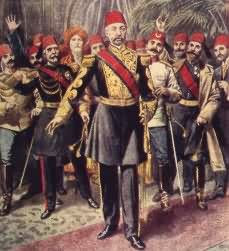In the runup to the horrors of the First World War, social turmoil seemed to be the (dis)order of the day, especially in Europe and the Middle East. The distemper of the times was particularly acute in the restive factions of that peculiar amalgamation of politics and religion known as Islam, leading some to perceive a false dawn, a chance for a long-awaited dislodging of that religion from the affections of its adherents, which would be accomplished by modern science, education, and the overwhelming appeal political liberalism:
THE STRUGGLE, between the religion of Mohammed and the religion of Christ, says Cornelius H. Patton, in The Congregationalist and Christian World (Boston), is a stubborn and complicated one. Treating of the religious side of this conflict, for it has also a political side, he speaks with admiration of the devotion which characterizes the people of Islam, their habits of prayer, and their profound faith in the reality of their creed. Taking for granted, of course, that their creed is false and degrading, he thinks that it must crumble into extinction under the rays of modern enlightenment. Education, political liberty, and a knowledge of the truths of science are tending to show its absurdity and hasten its abolition.
Patton wasn’t the first and certainly not the last to imagine that “education” (which he doesn’t define), “political liberty” (the successful establishment of which he doesn’t attempt to outline), and “science” (again, undefined) are panaceas which will cure all social ills.
Patton does concede,
There is a strange power in this religion.
. . . but he argues that it has an Achilles heel:
One thing that Islam can not stand is the daylight, “and here is our hope.”
More than one Western politician has deceived him- or herself with the notion that all of the world’s peoples—but especially believers in Islam—are closet Jeffersonians yearning for freedom:
The more enlightened Turks want their children educated in our way and they welcome the liberty of learning which came to them with the constitution.

At the time (1911), “reforms” were being attempted in Turkey to secularize Islam:
The present program of the Young Turks, remarks Mr. Patton, seems to be “to make the Empire Mohammedan, to find the much needed unity in the Turkish religion.” But disintegrating influences are at work on every side, not least of these being the pressure of Western thought.
Predictably, efforts to demythologize or otherwise radically alter any religious system will always lead to bloodshed, which history tells us is exactly what occurred.
This forlorn hope has relevance in the West today, however. Paradoxically, if the Islamic scripture is being accurately translated, then Christians, Jews, and everybody else might have cause to rejoice, at least for the time being.
We’re told that Islam’s god permits the faithful to lie to, cheat, and, if necessary, murder the “infidels” if they fail to submit to Islam’s religious-political system. There are billions of Muslims all over the planet who haven’t—so far, anyway—taken up the sword as they have been instructed to do, neglecting that holy mission even though they have full permission from their deity to do so.
Essentially, then, anyone not adhering to the religion of Mohammed can thank God for bad Muslims.

The Republican Party has failed to stop Obama because it is unable to articulate what he has done wrong besides violating the processes and procedures of government. Its establishment is unable to convincingly debate him because they agree with his premises while challenging his processes.
—I still think you should hear this again!